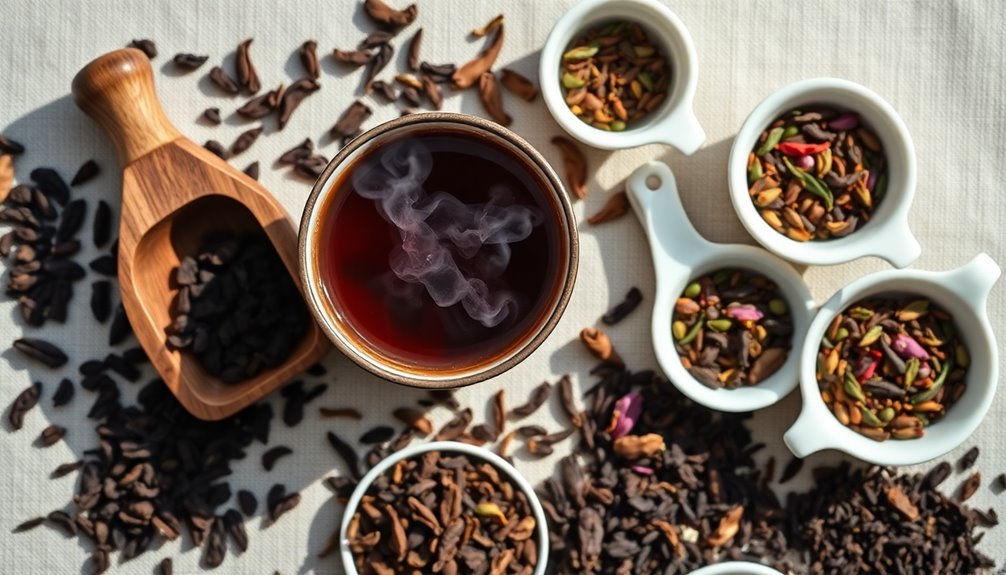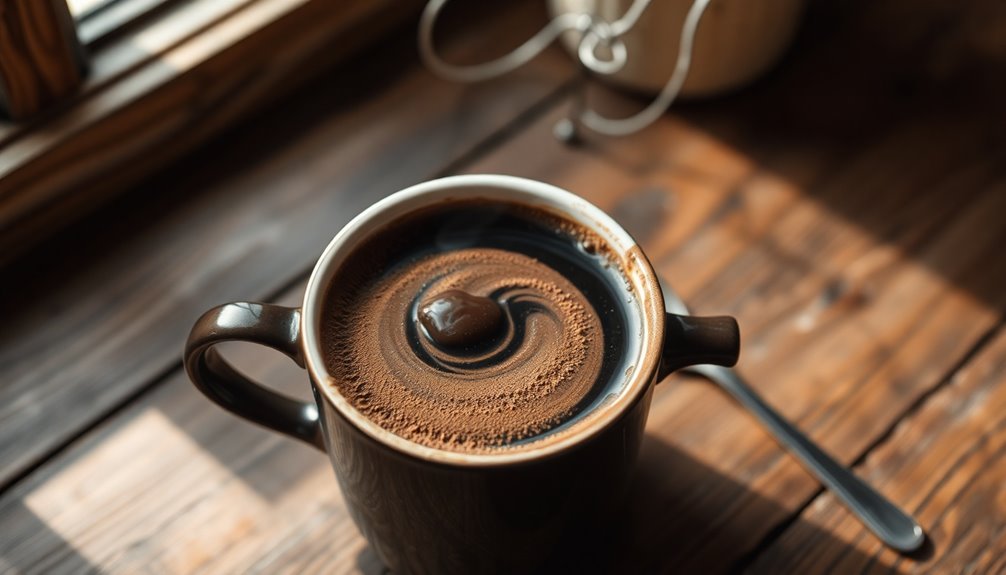Chai tea typically contains about 40mg of caffeine per cup, which makes it a moderate choice if you're keeping tabs on your caffeine intake. However, this amount can vary considerably based on factors like steeping time and the type of tea used. Some cups might have anywhere from 20mg to 100mg of caffeine, particularly if you steep it longer. To compare, regular coffee usually has around 120mg. If you're curious about how preparation methods or chai variants can impact caffeine content even further, there's a lot more to explore!
Key Takeaways
- Traditional chai typically contains around 40mg of caffeine per cup, though this can vary based on preparation.
- Caffeine levels in chai can range from 20mg to 100mg, influenced by steeping time and tea type.
- Longer steeping times, up to 10 minutes, can significantly increase caffeine content, potentially doubling it.
- Chai lattes made from powder generally have caffeine levels between 25mg to 55mg, making them a milder option.
- The presence of tannins in chai slows caffeine absorption, providing steadier energy without jitters.
Understanding Chai and Its Variants
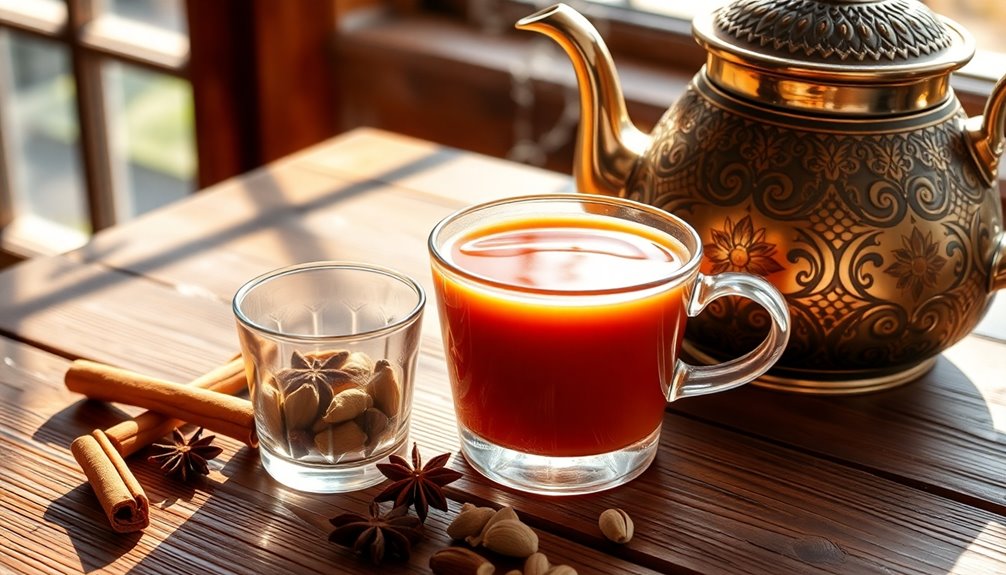
When you plunge into the world of chai, you'll discover that it's more than just a comforting beverage; it's a blend of black tea and spices that varies widely in preparation.
Each cup can contain around 40mg of caffeine, influenced by steeping time and the tea-to-spice ratio. Some variants, like Prana Chai, can pack between 20 to 100mg, depending on how long you let it steep.
Unlike coffee, chai's tannins slow caffeine absorption, giving you a calm, focused energy. If you're exploring chai lattes, expect caffeine levels between 25 to 55mg, depending on the mix.
If you want a caffeine-free option, try rooibos chai—it's perfect for those avoiding caffeine while still enjoying a flavorful tea experience.
Caffeine Content in Traditional Chai

Chai isn't just about flavor; it also delivers a notable caffeine punch. Traditional chai typically contains around 40mg of caffeine per cup, but this can vary between 20mg to 100mg based on the tea-to-spice ratio and steeping time you choose.
If you steep your chai longer, you'll likely boost its caffeine content. Curiously, the tannins in chai slow down caffeine absorption, giving you a more gradual energy release compared to coffee. This means you can enjoy the stimulating effects without the sudden crash.
If you're opting for a chai latte made from powder, expect caffeine levels between 25mg to 55mg per serving. For a caffeine-free option, consider rooibos chai, perfect for those sensitive to caffeine.
Comparing Chai and Coffee Caffeine Levels
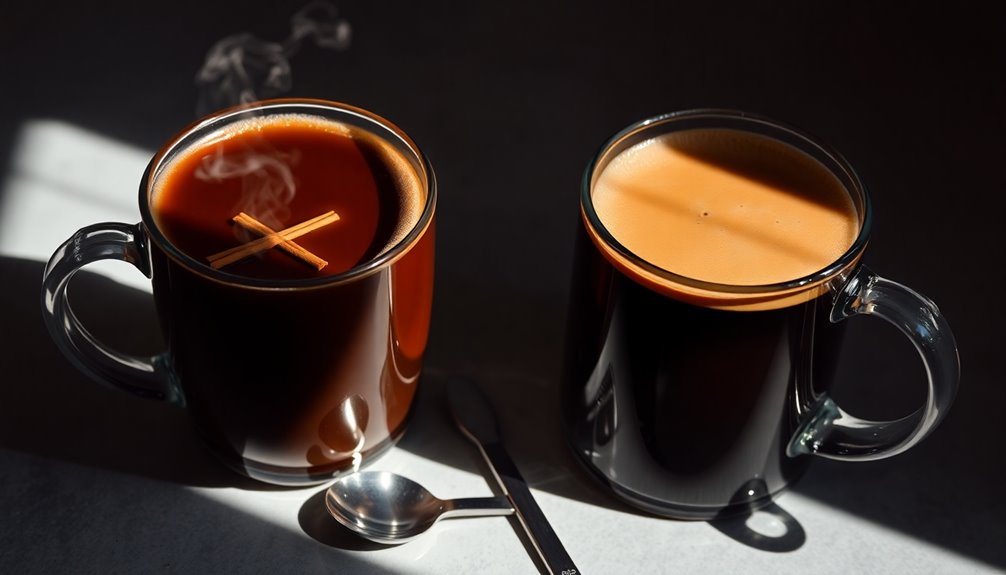
When you compare chai and coffee, you'll notice a significant difference in caffeine content.
A typical cup of chai has about 40mg of caffeine, while coffee usually packs around 120mg.
This variation can affect how each drink impacts your body, leading to different energy levels and sensations.
Caffeine Content Overview
While many people enjoy their morning coffee for a quick caffeine boost, chai tea offers a different experience with its lower caffeine content. A typical cup of chai contains about 40mg of caffeine, which is considerably less than the average coffee's 120mg. The caffeine absorption in chai is slower, thanks to the tannins, leading to a calm and focused alertness instead of the jitters coffee can cause. Additionally, incorporating chia seeds into your diet can enhance feelings of fullness and support weight management.
Here's a quick comparison:
| Drink Type | Caffeine Content (mg) |
|---|---|
| Chai Tea | 20 – 100 |
| Chai Latte | 30 – 35 |
| Powdered Mix | 25 – 55 |
| Coffee | 120 |
Choosing chai tea can provide a more balanced caffeine experience.
Chai vs. Coffee Comparison
Although many people reach for coffee to kickstart their day, chai tea offers a gentler alternative that suits those seeking a more balanced caffeine experience.
A typical cup of chai contains about 40mg of caffeine, considerably lower than the average cup of coffee, which packs around 120mg. This lower caffeine content, coupled with the tannins in chai, allows for a slower absorption, providing a steadier energy boost without the jitters often associated with coffee.
Depending on steeping time and tea type, chai's caffeine can range from 20 to 100mg. For those avoiding caffeine altogether, rooibos chai delivers a delicious, caffeine-free option, unlike traditional coffee, which always contains caffeine. Additionally, the importance of hydration is crucial for maintaining energy levels throughout the day.
Effects on Body
Chai tea offers a distinct experience for your body compared to coffee, particularly in how its caffeine affects you. A typical cup of chai contains about 40mg of caffeine, which is less than the 120mg you'd find in coffee.
Here's how the effects compare:
- Gradual Alertness: Caffeine in chai releases slowly due to tannins, promoting a steady rise in alertness.
- Calm Focus: Chai can enhance mental clarity without the jitters caused by coffee.
- Nervous System Impact: The slower absorption leads to milder effects on the nervous system.
- Variability: Steeping time and spice ratios can alter caffeine levels in chai.
- Complementary Practices: Enjoying chai alongside herbal teas like chamomile can further enhance relaxation and reduce stress levels.
Health Benefits of Chai

When you sip on a warm cup of chai, you're not just enjoying a delightful blend of flavors; you're also reaping a host of health benefits.
The tea polyphenols in chai enhance your attention and focus, promoting cognitive benefits that can help you stay sharp. The spices, like cardamom and cinnamon, have anti-inflammatory properties that have been valued for centuries. Additionally, the turmeric benefits in chai are well-known for their potential to reduce inflammation and improve overall health. The anti-inflammatory properties of turmeric can also aid in reducing symptoms of arthritis and other inflammatory conditions. Including chai in your daily routine can provide a delicious way to support both your mental and physical well-being.
Regular chai consumption may even protect against neurodegenerative diseases like Alzheimer's and Parkinson's due to its antioxidant content. Additionally, research suggests the spices can potentially influence cancer genetics, adding to its health benefits.
Plus, drinking chai supports cardiovascular health, making it a wholesome alternative to other caffeinated beverages. Furthermore, the essential oils in chai spices can contribute to a sense of calm and relaxation, enhancing your overall wellness.
Enjoying chai means indulging in both taste and wellness!
Preparation Methods Affecting Caffeine

When you prepare chai tea, both the steeping time and the tea-to-spice ratio play essential roles in determining its caffeine content.
Steeping your tea for longer can boost caffeine levels considerably, while the balance of tea and spices affects how much caffeine you extract.
Adjusting these variables can help you tailor your chai experience to your energy needs.
Steeping Time Impact
While brewing your chai tea, the steeping time plays an essential role in determining its caffeine content. Most caffeine is released within the first three minutes, so adjusting your steeping time can markedly alter your cup's strength.
Here's how it breaks down:
- 3 minutes: Ideal for a balanced chai with around 40mg of caffeine.
- 5 minutes: Slightly richer, caffeine levels may increase.
- 10 minutes: Substantial boost in caffeine, potentially doubling your intake.
- Less than 3 minutes: You could lower caffeine content by up to 80%, resulting in a lighter chai.
Tea-to-Spice Ratio
The tea-to-spice ratio considerably impacts the caffeine content of your chai tea. When you prepare chai tea, a higher proportion of tea increases the amount of caffeine. For instance, using 5-8 grams of black tea in a 16 oz water infusion typically yields lower caffeine compared to concentrated versions.
| Tea-to-Spice Ratio | Amount of Caffeine (mg) |
|---|---|
| Traditional Brew | 11 – 24 |
| Chai Concentrate | Higher than traditional |
| Less Tea, More Spice | Lower |
| More Tea, Less Spice | Higher |
Exploring Chai Tea Options
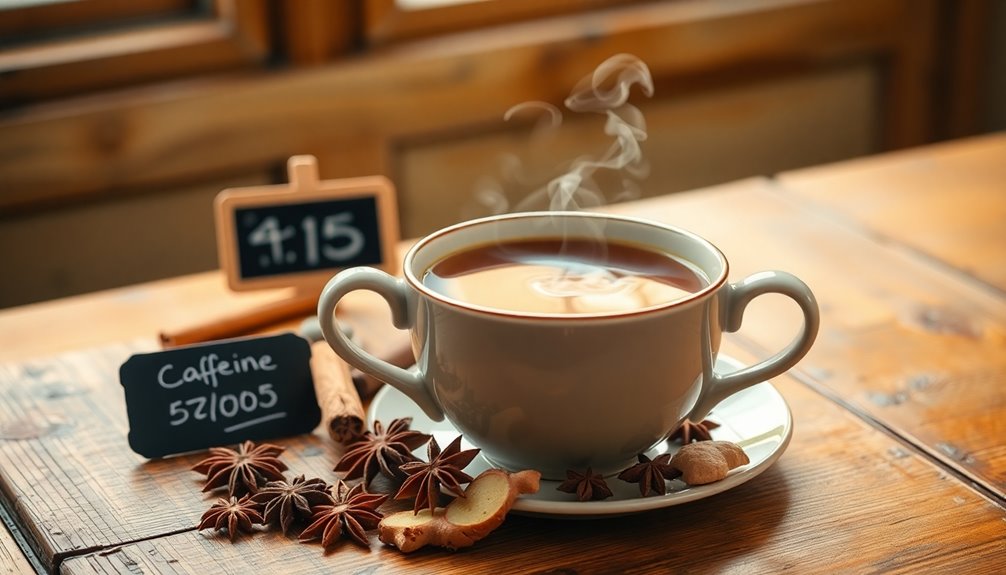
Exploring the diverse options of chai tea can enhance your tea experience, especially since each variety offers unique flavors and caffeine levels.
Here are some choices for you to evaluate:
- Traditional Masala Chai: This blend can have caffeine ranging from 20 to 100mg per cup, depending on steeping time and spice ratios.
- Chai Lattes: Made from powdered mixes, these typically contain 25 to 55mg of caffeine.
- Concentrates: Often have about 30 to 35mg of caffeine per cup, offering convenience without sacrificing flavor.
- Rooibos Chai: A caffeine-free option, perfect for sensitive drinkers.
With these options, you can enjoy a gentle energy boost from chai tea while exploring its rich variety!
Frequently Asked Questions
How Much Caffeine Is in Chai Tea Vs Coffee?
When you compare chai tea to coffee, you'll notice a significant difference in caffeine content.
A typical cup of chai contains around 40mg of caffeine, while coffee has about 120mg. This means chai offers a more gradual energy boost, thanks to its tannins that slow caffeine absorption.
If you're looking for a milder pick-me-up without the jitters, chai might be your better choice. Just remember, steeping time can also affect caffeine levels!
How Much Caffeine Is in a Starbucks Chai Tea?
You know what they say, "Too much of a good thing can be wonderful."
When it comes to Starbucks' Chai Tea, you're looking at around 95mg of caffeine in a grande size. This comes mainly from the black tea in their chai blend.
If you prefer something lighter, the tall Chai Tea option has about 40mg of caffeine.
Don't forget, you can always customize your drink to fit your caffeine preferences!
How Much Caffeine Is in a 12 Oz Dirty Chai?
A 12 oz dirty chai typically packs between 40 to 100 mg of caffeine.
This variation depends on how much black tea and espresso you use. If you steep the black tea longer, you might boost the caffeine content even more.
Remember, espresso contributes about 63 mg per shot.
This blend provides a gradual energy boost, so you won't feel the jitters like you might from a regular cup of coffee.
Will Chai Tea Keep You Awake?
Chai tea can keep you awake, but it's more about how your body responds to caffeine.
Since chai contains less caffeine than coffee, you'll likely experience a gentle boost in alertness without the jitters.
The presence of tannins slows caffeine absorption, leading to a more gradual increase in focus.
If you drink chai in the evening, you may find it doesn't disrupt your sleep as much as stronger caffeinated beverages.
Enjoy it mindfully!
Conclusion
To sum up, savoring a cup of chai not only delights your taste buds but also delivers a decent dose of caffeine. Whether you prefer traditional blends or modern variations, understanding the caffeine content can enhance your experience. So, sip smartly and savor the soothing spices that chai offers. With its rich flavors and potential health perks, chai's a charming choice for caffeine seekers. Embrace this aromatic adventure, and let each cup invigorate your day!




